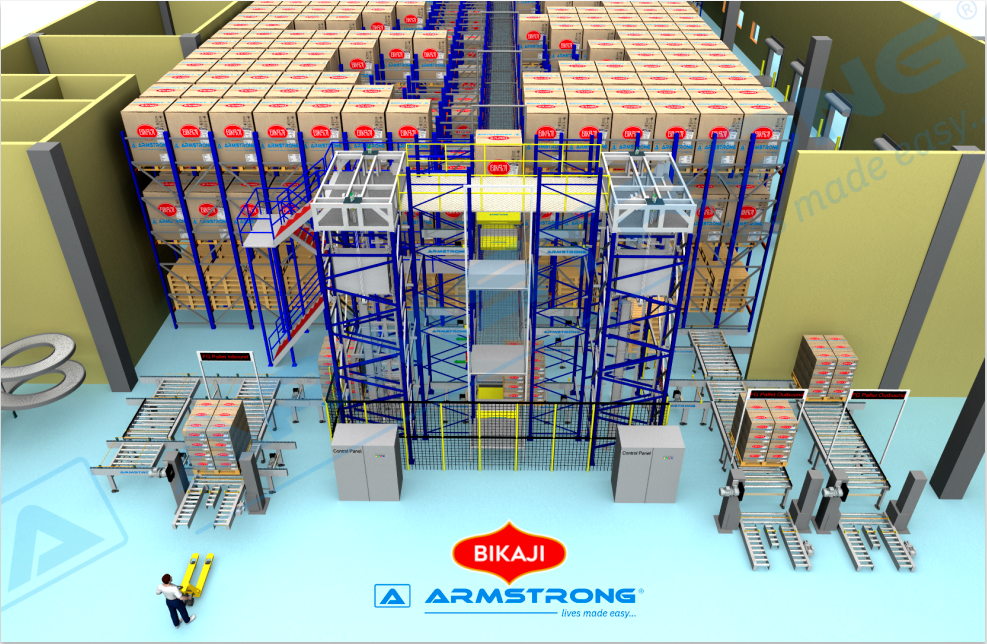Latest
Zenith of Accuracy & Efficacy at the ‘Dock’

Customer
Bikaji
Launch Date
Jan 2020
Location
Bikaner, India
Today’s market is fast-paced and highly volatile, thanks to e-commerce on the rise, and it is doubly so for FMCG companies. In a world affected by Covid 19, the way of doing business has changed, and packaged foods are rising in demand. However, not only has the volume of orders increased and become more erratic, consumer trends and expectations have changed as well, with more asking for a variety in products. To handle variable volumes with diverse compositions at short notice and a higher velocity calls for better storage handling.
Bikaji is one of India’s leading FMCG food brands. They have 100+ products in their repertoire of packaged snacks, with more than 10 different varieties of their signature Bhujia alone. They approached us to conduct a diagnosis of their production facility at Bikaner, Rajasthan. High SKU proliferation, unpredictability in demand and varying popularity of products had led to troubles with inventory control, dispatch accuracy and order fulfillment time. Slow velocity of goods within the facility led to problems with production and dispatch volumes, leading to operational difficulties and revenue losses. Armstrong Dematic immediately identified storage & retrieval as the key problem area.
The uniqueness of this facility was there being unused storage space on the G+1 level. The space was not being utilized because of the difficulty in transportation of cartons to and from storage. With Armstrong Dematic’s end-to-end consultative approach, a solution which would take cartons from production up to the storage and bring them back down directly to the dock to be loaded into trucks was ideated. Solutions such as goods lift and stacker cranes were not feasible due to their weight, and labour & time expense. Thus, a dense, lightweight and fast system was needed.
Armstrong Dematic’s answer to this was Asterope- a ‘Mother & Baby Shuttle’ ASRS system. With Armstrong Dematic’s innovative solution, poor space utilization and slow operations were eliminated. Increased accuracy and visibility, inventory control and tracking, and improved ergonomics resulted in increased throughput, labor productivity and faster order fulfillment and market replenishment.


A mother and baby shuttle ASRS system was set up. The operators simply place the finished products on the shuttle which carries to the G+1 level. There the product would be placed in an appropriate location which would be recorded with name, date and time by the WMS. When needed for dispatch, product would be removed from its location by the mother-baby shuttle while following the First-In-First-Out (FIFO) policy, which is crucial for food products which have a shelf life. The product would go down to the G level via gravity spiral to a telescopic conveyor which would take it straight to the dock to be loaded into a truck for dispatch.
The benefits of our solution were myriad. Better space utilization and saving of manpower and time in storage. Accurate inventory tracking led to accurate dispatches for both fast moving (high velocity but unpredictable demand) and slow moving (low inventory turnover and difficult to track) while reducing the order fulfillment time. SKU proliferation was handled easily and the specially designed WMS was integrated with the ERP software to ensure smoother and smarter options. The overall result? Multifold turnover in the same space, wider market reach, faster inventory processing and a happy client!
If you want to maximize space utilization, reduce operational costs, improve product and labor safety while simultaneously maximizing throughput and having inventory control, an ASRS solution is the way forward. The question you should be asking yourself isn’t whether you can afford an ASRS- ask yourself whether you can afford not having one

To provide operational excellence effortlessness, Armstrong Dematic leads the way towards innovative intralogistics and warehouse automation solutions.
Follow
Quick Links
Contact
© 2024 Armstrong Dematic. All Rights Reserved.
